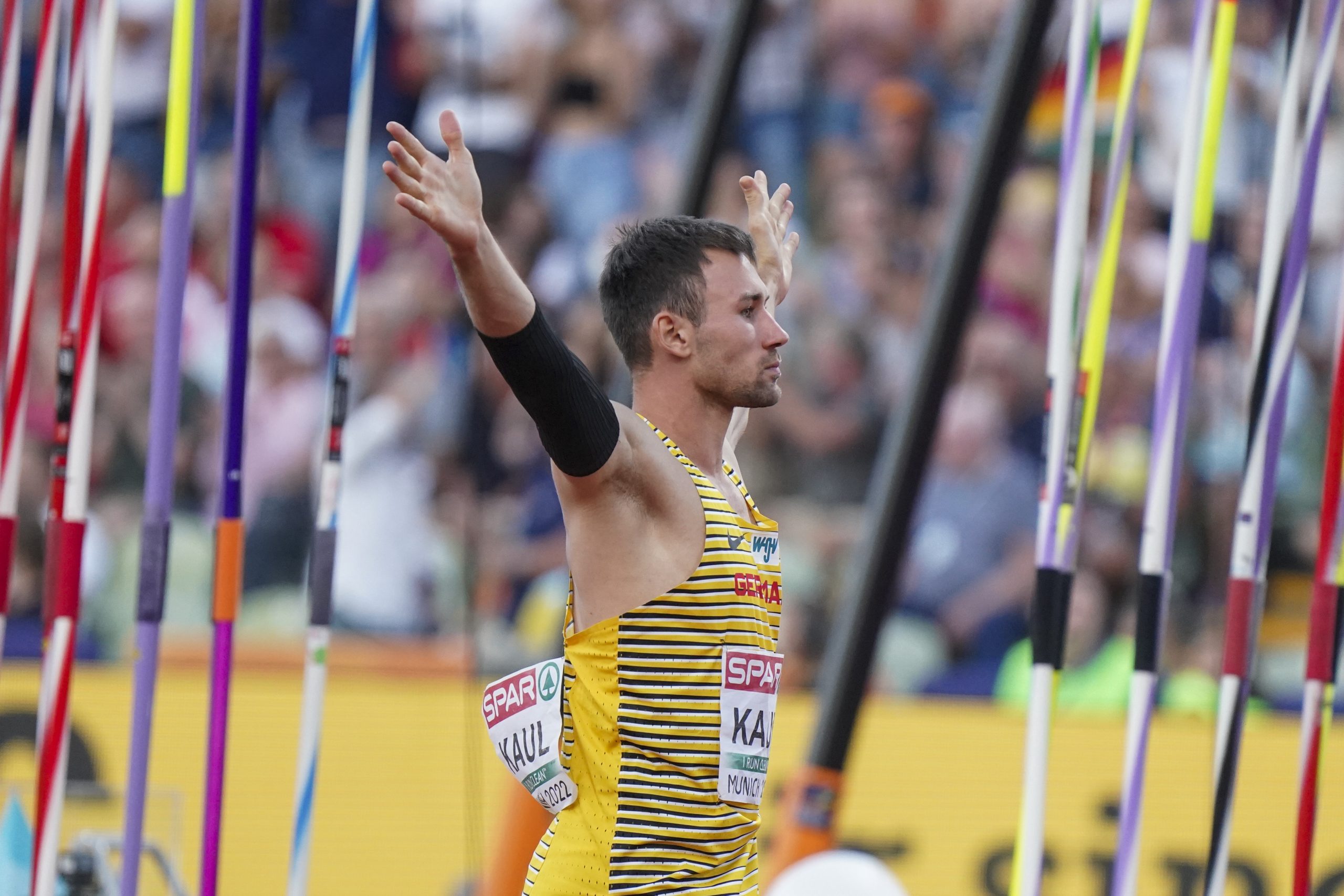There was something about the set of Niklas Kaul’s jaw as he concluded the penultimate event of the 2022 European Championships decathlon in the Munich Olympastadion.
This was a different Kaul to the 20-year-old who had accepted a last-minute place on the German team for the Berlin edition of the championships in 2018.
It was a different Kaul to the 21-year-old who found himself the last man standing amidst a chaotic decathlon in Doha in 2019.
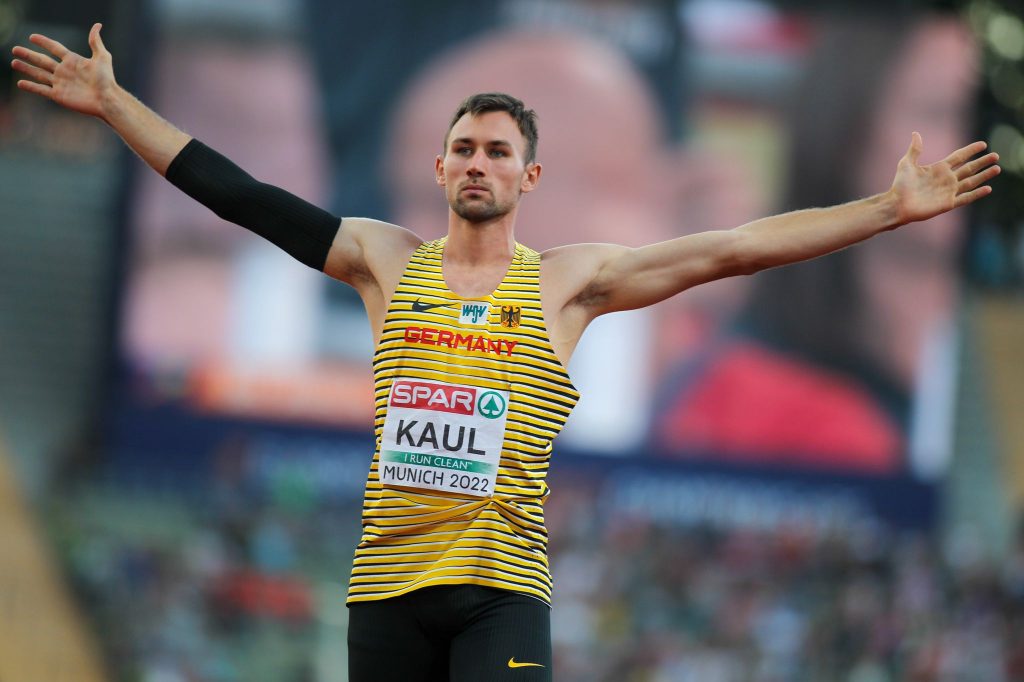
For the Kaul of 2022, a lot of life had passed since the small hours of the fourth of October in Doha. Elbow surgery in 2020, a traumatic injury during the 400m in the delayed Olympics in 2021, an uneven set of performances early in 2022. Kaul’s demeanour in Ratingen, Götzis and even in Eugene had been characterised by a furrowed brow, his frustration evident in the slight pause in the pit after a suboptimal jump, the tight grimace after an unexceptional throw.
In Munich, something was different about Kaul. Perhaps it was the home crowd. Perhaps it was the knowledge that his performances were starting to click. But throughout the two days of competition Kaul’s energy was markedly different. Typically reserved and focused in comparison to his high energy competitors, he was visibly relaxed and clearly enjoying the crowd.
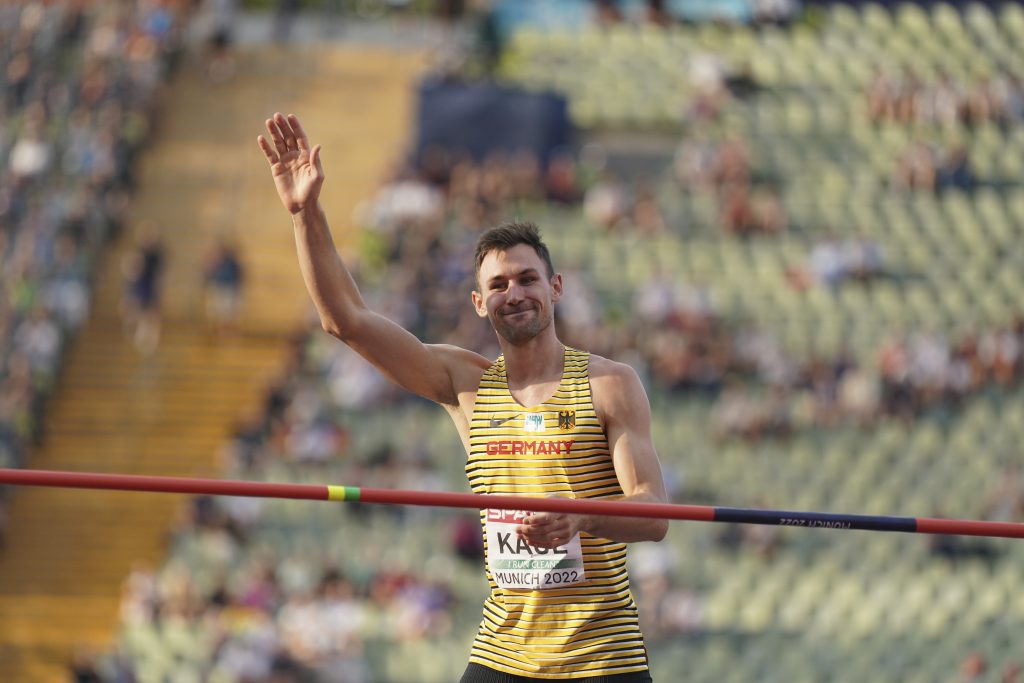
When Kaul is pleased with his efforts, there is a little knowing smile that tugs on the corner of his mouth. It is so subtle as to be easily missed, but it signals his satisfaction: a job done well. When the effort required is the difference between winning and losing, the smile disappears into something more intense, the satisfaction redirected into determination. And, more often than not, when that happens it is the forerunner to something special. That was the Kaul we saw in the last two events of the decathlon in Munich.
The world indoor heptathlon silver medallist, Simon Ehammer of Switzerland, had led the competition for nine events with his familiar vibrancy.
It is, however, the curse of the Day one specialist that they have medals hung around their necks long before the ten events are complete; and the curse of the Day two specialist that their surge is often greeted as an unexpected occurrence.
But neither of those stereotypes quite fitted this extraordinary competition in Munich.
Ehammer, who had never previously scored higher than 8400, stepped up his performance in several events, no longer reliant just on his speed and his enormous long jump to break the field.
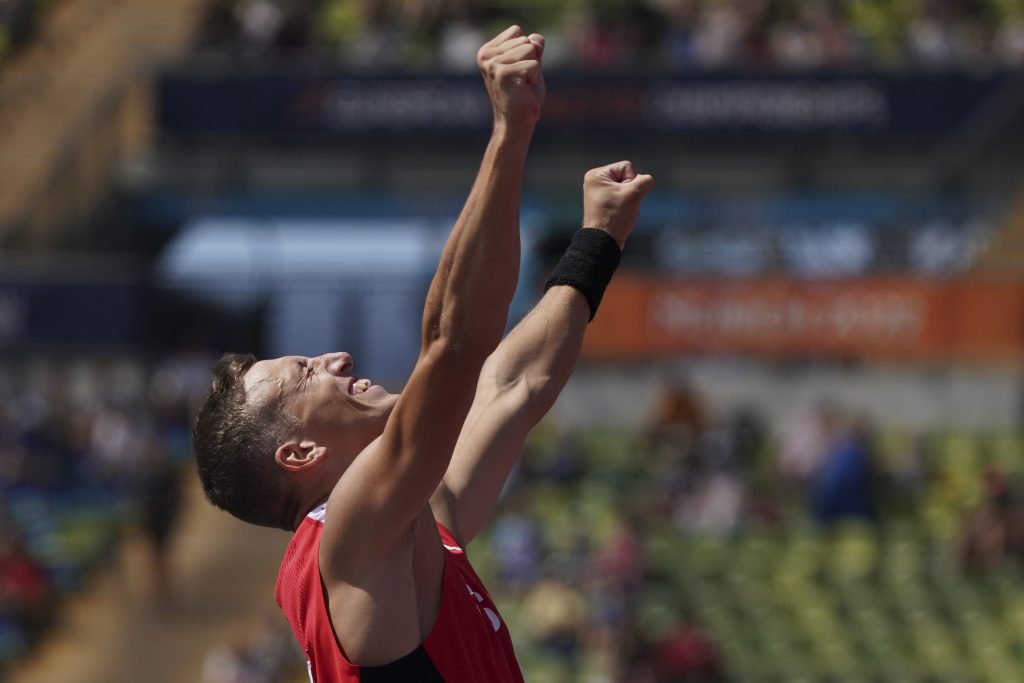
Kaul, who had only scored 57 points more than Ehammer this year, needed to reach deeper than ever before to retain the title for Germany, in Germany.
If this decathlon were a game of chess, Ehammer had played an inspired set of moves to force his opponent into a corner. But Kaul’s final two manoeuvres were those of a grandmaster. Check in the javelin, checkmate in the 1500.
Here is how the competition among the Decathletes of Europe unfolded, from start to finish.
100M
Kaul was drawn in the first heat of the 100m. In Eugene he had come within 100th of his PB and in Munich he dipped under it by the same margin with 11.16s.
While Norway’s Martin Roe had been absent dealing with sickness, injury and four months of Covid, he lost his national record to Markus Rooth and slid to third on the Norwegian all-time list behind Sander Skotheim. But he had a healthy return to competition, the fastest in the first heat in 10.94s ahead of Czech Adam Sebastian Helcelet, who had had a similarly challenging period, and Kaul.
The second heat had two false starts, both from Germans; Kai Kazmirek and then the 2018 champion Arthur Abele. It would be a brave official to disqualify Abele on his farewell tour – although such bravery would be demonstrated later in the competition – and since Abele’s offence was clarified as simply disturbing the start, all seven men remained.
Estonia’s Janek Õiglane was disappointed that he hadn’t been able to show his speed in Eugene, where he ran 11.12s, and he did better in Munich with 11.01s. Fredrik Samuelsson has had more problems than really seems fair in the last few years, but the Swede had a good return to championships level with an opener of 11.17s.
Onto the fastest heat, and within 50m the new world champion Kevin Mayer of France was much further behind Simon Ehammer than their respective talents would suggest. Mayer didn’t quite pull up but essentially jogged over the line. With Czech Ondřej Kopecký, Markus Rooth and Belgian Thomas Van der Plaetsen withdrawing ahead of the competition, that took the field – already restricted to 24 – down to just 20 men.
While Mayer was extracting himself from competition an event earlier than he had done in 2018, Ehammer was away and flying in 10.56s, followed by the Netherlands’ Rik Taam 10.76s, Italy’s Dario Dester 10.81s, the second Dutchman Sven Roosen 10.83s, and the remaining Frenchman Baptiste Thiery in 10.87s.
After one event:
- Simon Ehammer 961
- Rik Taam 915
- Dario Dester 903
- Sven Roosen 899
- Baptiste Thiery 890
- Martin Roe 874
- Sander Skotheim 865
- Janek Õiglane 858
- Pawel Wiesiołek 845
- Jiri Sýkora 841
LONG JUMP
With Mayer gone and several men potentially capable of 8300 to 8600, the competition was on.
Of course, Ehammer dominated the long jump. His second-round jump of 8.31m was his second-best jump ever, one centimetre beyond his then decathlon world best from Ratingen in May, and behind his 8.45m from Götzis later that month.
The individual long jump qualification took place shortly after the decathletes had finished their business. That included Estonia’s Hans Christian Hausenberg – who unfortunately had a no-mark – but none of them came near Ehammer’s 8.31m, the closest Thobias Montler with 8.06m. The individual final would take place as the decathlon neared its conclusion, and it was only then that Ehammer’s world lead of 8.45m would be surpassed as Miltiadis Tentoglou leaped 8.52m for gold. Montler took silver with 8.06m.
“It’s a little sad that Tentoglou took my world lead,” Ehammer said, “but I have two chances to take it back…”
Back to the decathlon, and Ehammer needed that big 8.31m jump. Even with his 8.45m in Götzis, he “only” improved his decathlon PB by 23 points to score 8377, and with Niklas Kaul looking dangerous after the 100m, there was no room for Ehammer to underperform in his banker event.
Kaul followed his 100m performance with a 7.10m long jump, solid in what is never his best event. Next after Ehammer was Skotheim in 7.56m, followed by Italy’s Dario Dester 7.46m, Poland’s Pawel Wiesiołek 7.45m and Taam 7.29m. Little changed after two events, Ehammer as expected extending his lead. While the gap from first to second was 274, second to tenth place were all within 100 points.
After 2 events:
- Simon Ehammer 2101
- Dario Dester 1828
- Sander Skotheim 1815
- Rik Taam 1798
- Pawel Wiesiołek 1767
- Sven Roosen 1746
- Martin Roe 1738
- Janek Õiglane 1736
- Adam Sebastian Helcelet 1713
- Kai Kazmirek 1701
SHOT
Sweden’s Marcus Nilsson was one of the two 16m throwers in the field and he had the longest throw of 15.69m, with the other 16m+ man Estonia’s Karel Tilga not far behind him in 15.21m. They were split by Adam Sebastian Helcelet with 15.30m and Niels Pittomvills 15.25m. Wiesiołek threw 15.11m and Arthur Abele continued to live life on the edge with two no-throws before landing 15.06m.
Ehammer threw a solid 14.24m, and maintained his lead, 254 points ahead of Dester, who threw a PB of 14.56m. But the 20-point reduction between first and second was less interesting than the difference between first and 11th, where Niklas Kaul sat after three events. Kaul had thrown 14.13m and 14.26m in the first two rounds, neither of which would be good enough to avoid him falling further behind Ehammer. But with a mighty roar, Kaul threw 14.90m.
Kaul had taken 41 points out of Ehammer’s lead, moving up three places as he did so, and reducing the gap to just under 400 points – the closest he would get until the penultimate event. There were still just over 100 points covering second and tenth place, so when the field finally caught up to Ehammer, there would be a lot of chopping and changing of position.
Unfortunately, Jiri Sýkora’s run of bad luck continued. A no-height in pole vault at the Czech champions, a freak hand injury in Eugene when he would otherwise have improved his decathlon PB, and now in Munich, a no mark in the shot.
Sander Skotheim, still finding his way with the transition to the senior implements, was near the bottom of the field with 13.65m but still in fifth place with his piece de resistance to come next. Baptiste Thiery made a significant improvement in his shot PB with 12.95m.
After three events:
- Simon Ehammer 2845
- Dario Dester 2591
- Pawel Wiesiołek 2563
- Rik Taam 2525
- Sander Skotheim 2522
- Adam Sebastian Helcelet 2521
- Janek Õiglane 2515
- Martin Roe 2514
- Karel Tilga 2485
- Sven Roosen 2482
HIGH JUMP
In Eugene, the youngest man in the field, Sander Skotheim, jumped higher than anyone else with a PB of 2.17m. The heights didn’t get that high in Munich, but Skotheim was still the last man standing after Estonia’s Maicel Uibo, Germany’s Tim Nowak, and Ehammer went out at 2.11m. Uibo was a little below his best to exit at that height, while Nowak had set an outdoor PB of 2.08m en route to his attempts at 2.11m.
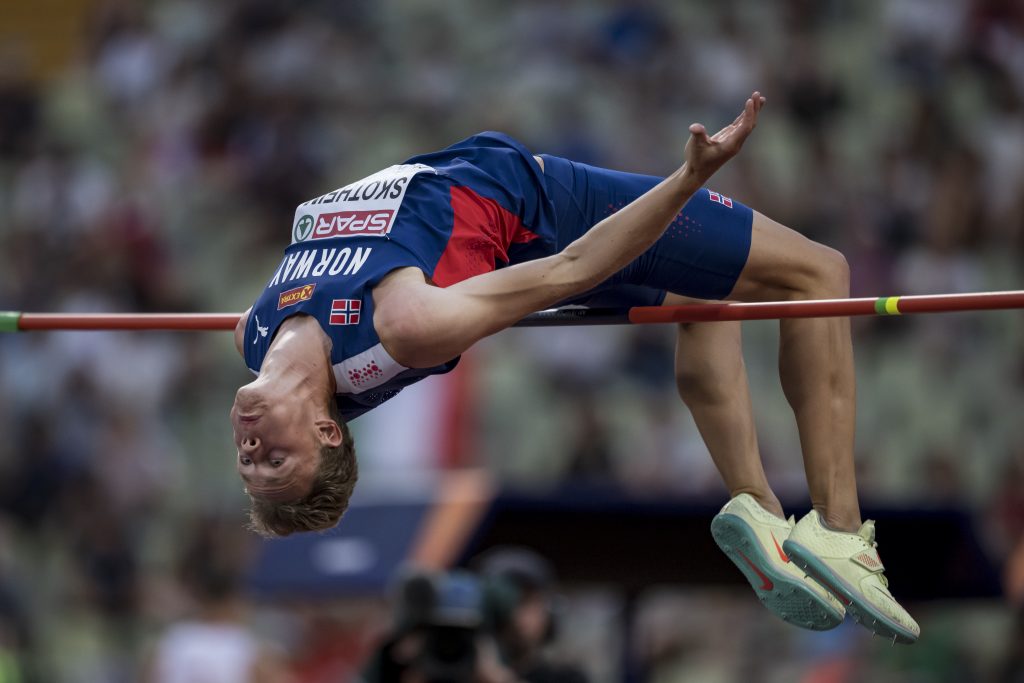
Ehammer’s PB of 2.08m – and then two remarkably close attempts at 2.11m – was significant for two reasons.
First, he and Kaul had been clearing similar heights this season; Kaul 2.05m in Eugene, Ehammer 2.04m in Ratingen and 2.05m indoors. So, for Ehammer to gain two heights on the German, who cleared 2.02m, meant additional valuable bonus points to act as a buffer as the German reduced the gap on his stronger day two.
But, more significantly for the longer term, the improvement in the high jump means that Ehammer is less dependent on his long jump for a big score. Ehammer’s 8.31m gave him 37 fewer points than his 8.45m in Götzis, but he recovered 28 of those points with his high jump.
“This is really a lot of fun,” he said afterwards. “This PB in high jump is really amazing. Never before have I had such a good high jump competition.”
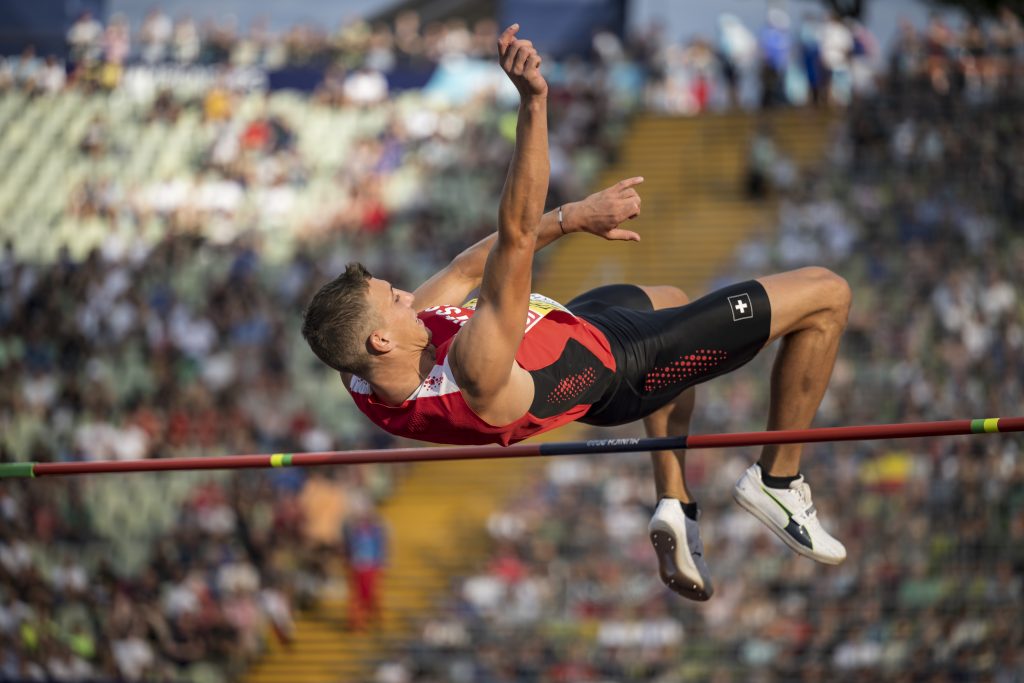
Further down the field, six athletes cleared 2.02m, including Niels Pittomvills, the Belgian’s best jump since 2017.
What the numbers don’t describe, however, was the energy exuding from Niklas Kaul during the event. Kaul retired from his third attempt at 2.05m, but the normally cool, controlled German was his most animated since Doha 2019. On that occasion he was far from home, and very much the newcomer on the senior German decathlon scene. On home soil, with a stadium full of Germans behind him, something special was brewing.
“It’s always special when you compete at home, with a home crowd,” he said later that evening. “I enjoyed it in Berlin 2018 a lot and it’s the same in Munich. Just an amazing crowd, and so much fun.”
However, there was a shock as reports emerged that Tim Nowak had collapsed after the event. He received the medical all-clear the next day and returned to watch the competition, but after describing his high jump performance as one of the best experiences of his career, he reflected: “Weird to feel how your body performs in one second and breaks down in the next.”
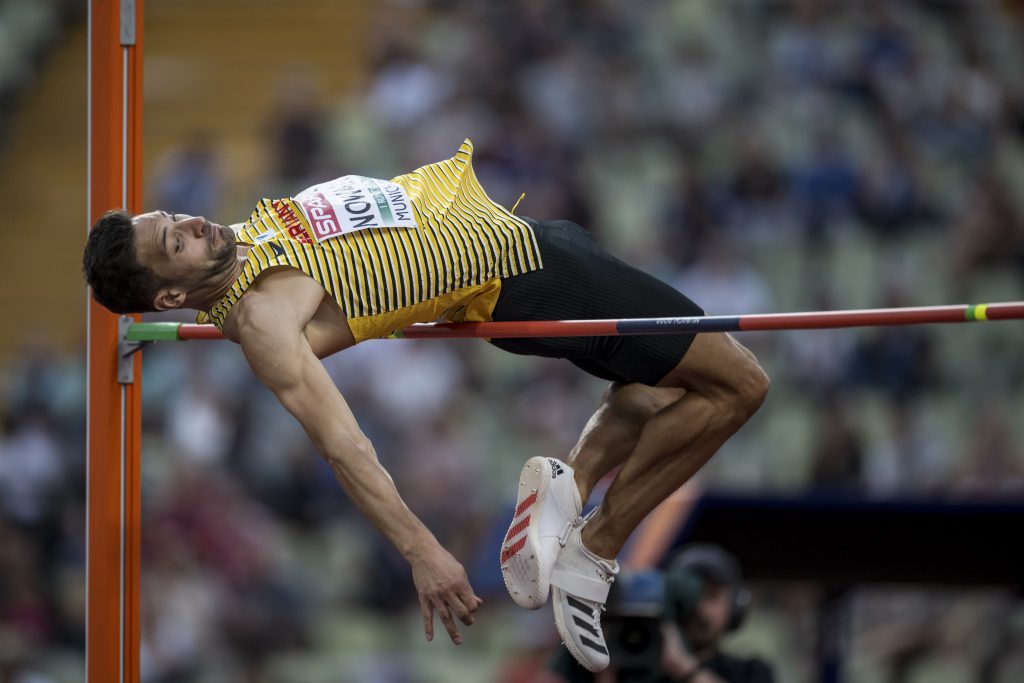
After four events:
- Simon Ehammer 3723
- Sander Skotheim 3428
- Dario Dester 3413
- Pawel Wiesiołek 3385
- Janek Õiglane 3337
- Adam Sebastian Helcelet
- Maicel Uibo 3304
- Niklas Kaul 3269
- Rik Taam 3265
- Kai Kazmirek 3257
400M
The first heat of the 400m brought together a number of those who had had ups and downs on their route to the start-line – Nilsson, Wiesiołek, Helcelet, Uibo, Roe, Pittomvils, and Tilga. Nilsson was fastest, improving on his times from Ratingen (51.31s) and Arona (50.47s) with 49.77s. Afterwards Roe, Helcelet and Wiesiołek all expressed how tired they felt, with weeks and months of training lost to injury and illness.
“I’m back!” said Wiesiołek. “Well, I’m not really back. I’m tired. But I’m happy.”
“I’m happy,” added Helcelet. “I didn’t expect this result actually. Because I didn’t have time to train for 400m, no high jump. I had 2 months without training, it was hard. But I’m here, I’m happy.”
“I missed decathlon,” said Roe. “After the Olympics I was out all of December just sickness, and when I got better, I got Covid and was out without training for 4 months. I’m happy to be here – and the results are ok. The first half is good, then I got tired – just not enough training for the whole decathlon.”
The second heat was missing Mayer, Sýkora, and now Nowak. That left Samuelsson, Õiglane, Abele and Skotheim. Both Skotheim and Õiglane ran PBs, the Norwegian taking fourth tenths off his previous best in 48.27s, and Õiglane a similar amount as he dived under 49 seconds for the first time in 48.80s.
And then onto the third heat, where the two Dutch men and Ehammer came into the race just a hundredth apart – Roosen and Ehammer with a PB of 47.27s and Taam 47.28s. Among the rest of the field – Kazmirek, Thiery, Dester and Kaul – only Kaul had never previously run under 48 seconds.
Kaul had been drawn in a slower heat in Eugene, where he ran his fastest time since 2018, so had every chance of being pulled to a fast time.
As the athletes came into the final straight, see-sawing back and forth, Ehammer managed to get his nose in front and finish in 47.40, with Taam, Thiery and the European U23 silver medallist Sven Roosen all in 47.6 times.
“I ran 2 48s this season, so I’m happy to be back in 47”, said Roosen after the race. “Last year when I broke my PB in Tallinn, I had an amazing day 1 – and it’s hard to compare that day 1 with where I am now. I lose 150 points on that…but my day 2 got way better than it was last year. But I just have to click these two to get 8100, 8200 maybe 8300. I switched coaches this year, Ingmar Vos came to coach in Pappendal, it’s really different strategy -next year it will pay off.”
Niklas Kaul did get pulled along to a faster time, breaking 48 seconds for the first time with 47.87s. While Ehammer had gained a little advantage in the high jump, Kaul had pulled back a few of the points he would expect to surrender to Ehammer in the 400m, and he finished the first day in seventh position.
“I am bit scared because I am in such a good rank after day one,” Kaul laughed after the 400m. “I am very satisfied with this first day. There were minor things, I could have done a bit better in long jump and high jump. You can always do better in a decathlon. But I am only 20 points under my overall PB and 477 points behind Simon Ehammer. I guess both of us delivered what we are capable of, left some points somewhere. Tomorrow it will be important who will commit less mistakes.”
Ehammer said: “I am not looking too much at what others will achieve tomorrow but focussing totally on myself. I have also strong events on day two like hurdles and pole vault. I have set big goals – I have to excel in the hurdles and the pole vault.”
At the end of Day 1
- Simon Ehammer 4661
- Dario Dester 4327
- Sander Skotheim 4324
- Janek Õiglane 4208
- Pawel Wiesiołek 4205
- Rik Taam 4193
- Niklas Kaul 4184
- Kai Kazmirek 4155
- Adam Sebastian Helcelet 4122
- Maicel Uibo 4109
110M HURDLES
Another short sprint, another bundle of false starts.
Ehammer was the first culprit and – as in the 100m the previous day – Arthur Abele the second. Having been fortunate the first time, his luck run out and he was disqualified from competition. But it is Munich, and it is Arthur, and it is his swansong, and so the gods of officialdom looked kindly upon his case and allowed him to later run the race on his own, where he clocked 14.50s.
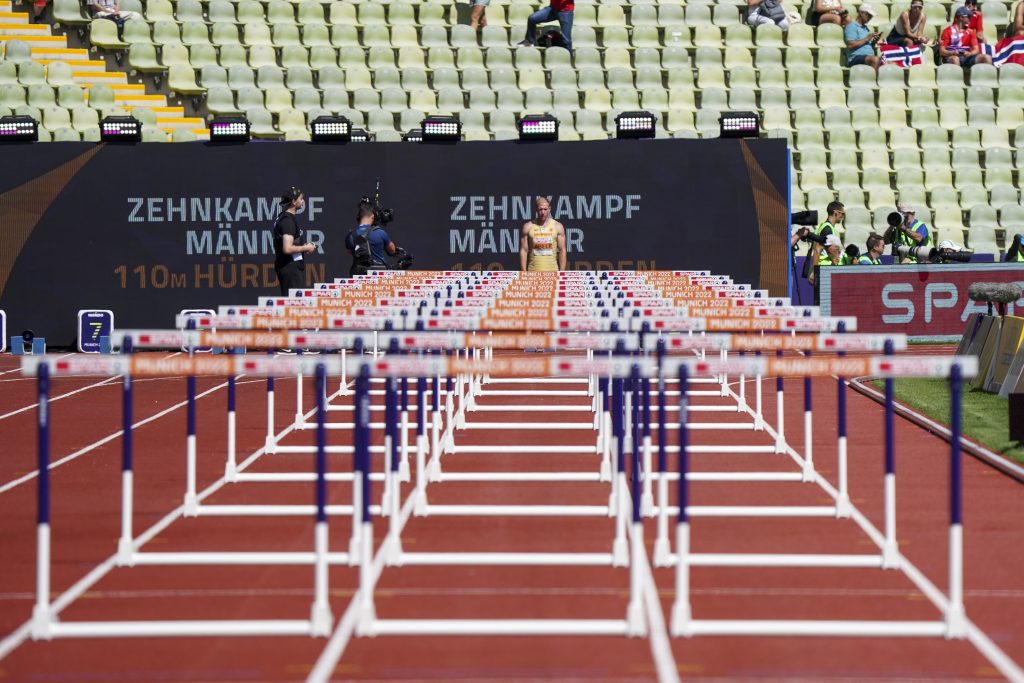
In the original race, Ehammer unsurprisingly was the fastest in 13.75s, Adam Sebastian Helcelet continued to surprise himself with 14.36s and Õiglane had a good run with 14.39s. Rik Taam did not start.
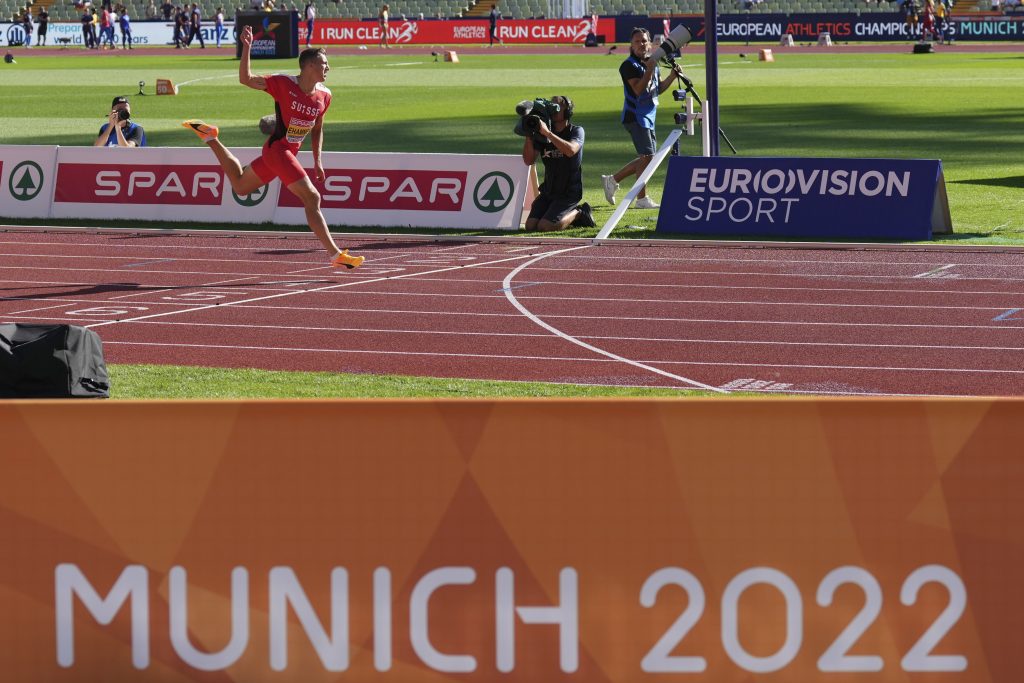
As in the long jump, the individual 110m hurdles clashed with the decathlon. While he had been denied a place in the decathlon by the restricted field size, Finley Gaio of Switzerland – alongside Abdel Larrinaga of Portugal – had qualified for the individual hurdles. Both won their heats – Gaio in a PB of 13.46s – and went onto the semis where they would join the top athletes who had received a “bye” into the next stage.
Larrinaga was knocked out but – after a cruel spell in the unpopular hot seats – Gaio was the last of the non-automatic qualifiers for the final with his time of 13.50s. He repeated that time in the final where he finished fifth, beating the likes of 2018 world indoor champion Andrew Pozzi.
In the decathlon, this was the last of Ehammer’s dominant events and now, it was over to the day two specialists to make inroads into the lead the Swiss had built up over six events.
Õiglane was now in third, 535 points behind Ehammer.
Kaul was now in fourth, 567 points behind Ehammer.
And Uibo was in 10th, 684 points behind first place.
After six events:
- Simon Ehammer 5668
- Dario Dester 5245
- Janek Õiglane 5133
- Niklas Kaul 5101
- Sander Skotheim 5098
- Kai Kazmirek 5076
- Adam Sebastian Helcelet 5051
- Pawel Wiesiołek 5016
- Sven Roosen 4984
- Maicel Uibo 4984
DISCUS
In Eugene Jiri Sýkora had broken Bryan Clay’s world championships best in the discus, but of course he had fallen by the wayside with his no-mark in the shot. Three other men had 50m+ PBs – Tilga, Wiesiołek and Helcelet, but only Tilga was able to come close to that, with 49.91m.
More significantly for the placings, Uibo and Kaul were both 49m throwers at their best and therefore had the potential to throw some 10m more, and score over 200 points more, than Simon Ehammer, who had never thrown beyond 40m.
Ehammer’s PB was the shortest in the field, and he also had the shortest throw, just 34m. That meant he was giving away an additional 5m to the bigger throwers. But while Uibo had a decent throw of 46.59m and Õiglane recovered from his discus disaster in Eugene with 41.97m, Kaul could only manage 41.80m, only four from the bottom of the field. So, while Kaul had closed the gap to Ehammer to 428 points, he had missed the opportunity to close it more.
After seven events:
- Simon Ehammer 6230
- Dario Dester 5972
- Kai Kazmirek 5847
- Sander Skotheim 5847
- Janek Õiglane 5838
- Niklas Kaul 5802
- Adam Sebastian Helcelet 5786
- Maicel Uibo 5784
- Pawel Wiesiołek 5738
- Karel Tilga 5735
POLE VAULT
For once, the significant development in the pole vault was not the result of a no-height, a snapped pole or some other disaster, although one of those things did happen.
With his big throw in the discus, Karel Tilga had moved up from 13th to tenth, but his bid would end there as he no heighted in the vault.
The first group to compete was the one with the bigger vaulters, and of course Baptiste Thiery had his moment to shine; not quite at the 5.70m of his French U23 vault title in July , but the best of the jumpers with 5.40m. Uibo’s form has been variable all year, but this was a good competition, and he had a solid 5.30m. Õiglane was also close to his best with 5.10m.
This was one event where, like the high jump, Ehammer and Kaul were of a similar standard, the Swiss with a PB of 5.10, and the German 5.00. Kaul wouldn’t expect to concede too much in this event before he unleashed his two final mighty events. But Ehammer had other ideas. First, he matched his 5.10m PB, and then went beyond to clear 5.20m, his vault problems of 2021 long forgotten.
Kaul was in the second group, and entered at 4.70m, which he cleared at his second attempt, before clearing 4.80m and 4.90m on his first. But he stopped short at 5m, unable to get over.
While Ehammer conceded 30 points to Uibo, it wasn’t 60; and instead of gaining just 30 points on Kaul, he gained 90.
The Estonians had gathered themselves in third and fourth place for a final charge, while Kaul had dropped back to seventh. But the position was less important than the points.
After the hurdles, Kaul had trailed Ehammer by 567 points – the biggest gap between them at any point throughout the entire competition. After discus, Kaul had reduced that to 428. But after vault, the gap had grown again to 520 points.
Had the German left himself too much to do?
After eight events:
- Simon Ehammer 7202
- Dario Dester 6852
- Maicel Uibo 6788
- Janek Õiglane 6779
- Kai Kazmirek 6757
- Sander Skotheim 6757
- Niklas Kaul 6682
- Marcus Nilsson 6666
- Pawel Wiesiołek 6587
- Adam Sebastian Helcelet 6576
JAVELIN
Group A and Group B took place an hour apart, and split along season’s bests, which put Ehammer in the first group, and Kaul and the Estonians in the second. Pawel Wiesiołek withdrew from the competition ahead of the event.
In the first group Baptiste Thiery built on his earlier shot PB to twice surpass his previous javelin best, his longest throw 55.07m. Likewise, in the first round Dario Dester improved his lifetime best to 57.24m. Ehammer had two good valid throws, 53.46m in the first round and 52.89m in the second, only a couple of metres down on his 55.98m PB, although as in the discus, he had the shortest throw in the field.
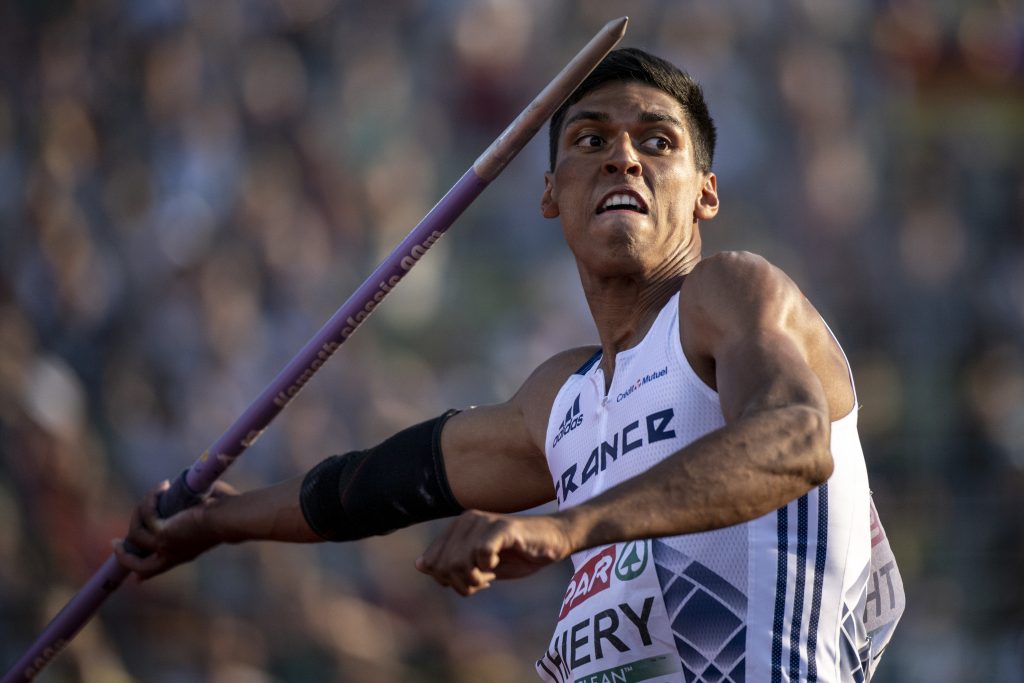
That took Ehammer to 7842 points. His position was likely now out of reach of the Estonians, but it also looked to be on the margins of what even Niklas Kaul could achieve.
Ehammer’s improvement in the vertical jumps had added an additional 60 points to the gap that Kaul needed to bridge, as well as the 100 plus points the German had missed out on in the discus.
If Ehammer were to run 4:50 in the 1500m, Kaul would need to throw 72m AND match his 4:13m from Eugene, where chasing Ayden Owens-Delerme had brought him a two second PB.
If Ehammer were to run his 4:42 1500 PB from 2020, Kaul would need to throw 75m and run 4:13.
The German hadn’t breached 70m all year, and there was no Owens-Delerme to chase. But there was a German crowd.
Uibo was the first to start; Õiglane and Kaul the final two to throw.
Uibo was just nine points ahead of Õiglane coming into the penultimate event. Õiglane had the bigger javelin, but Uibo was faster over 1500. Uibo threw 62.74m in the first round, followed by two fouls. Õiglane’s first thrown was 67.17m. His second throw didn’t improve on that. But his third was 70.94m, giving him a 125 point – and almost 20s – advantage over Uibo in the 1500m. Unless something went terribly wrong in the 1500m, it would be Õiglane in the mix for the medals rather than Uibo.
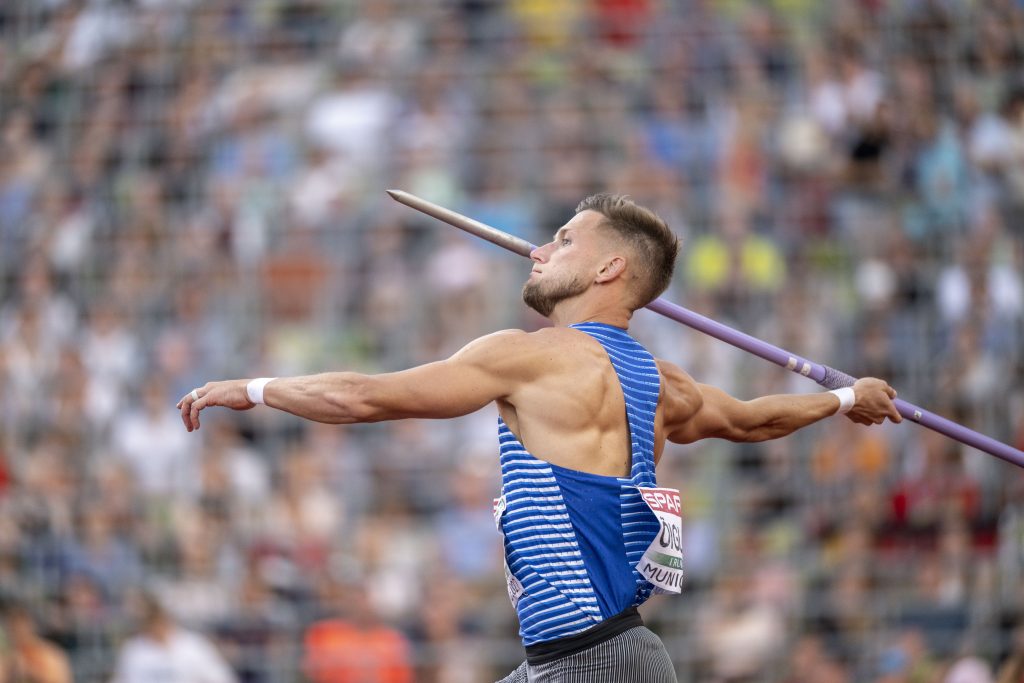
Meanwhile Marcus Nilsson had been slowly climbing up the leader board, and after a 1.33m PB in the third round with 66.69m, he moved up another place from eighth to seventh. Only 62 points spanned fourth to seventh: Uibo in fourth, Dester in fifth, Kazmirek in sixth and Nilsson in seventh. Nilsson was by far the fastest 1500m runner among those four, and it seemed likely he would move up in the final event to at least fourth place, but potentially to even challenge Õiglane for bronze.
The last man to throw was Kaul.
He needed 72m at least to give himself a chance come the final event.
His first throw was 70.98m, his first 70m throw since Götzis in May 2021. That wouldn’t be enough. His second throw was no better and a foul.
Last chance. He turned to the crowd, initiating their rhythmic clap. He jogged down the runway, pulled the spear back and then launched it.
It had barely left Kaul’s hand, when he bounced on the spot, once, twice, three times. He knew it was big, and he turned, arms aloft in triumph to the crowd who had roared him on. Then the distance flashed up – 76.05m. In a rare show of sustained emotion, Kaul screamed and took off down the track.
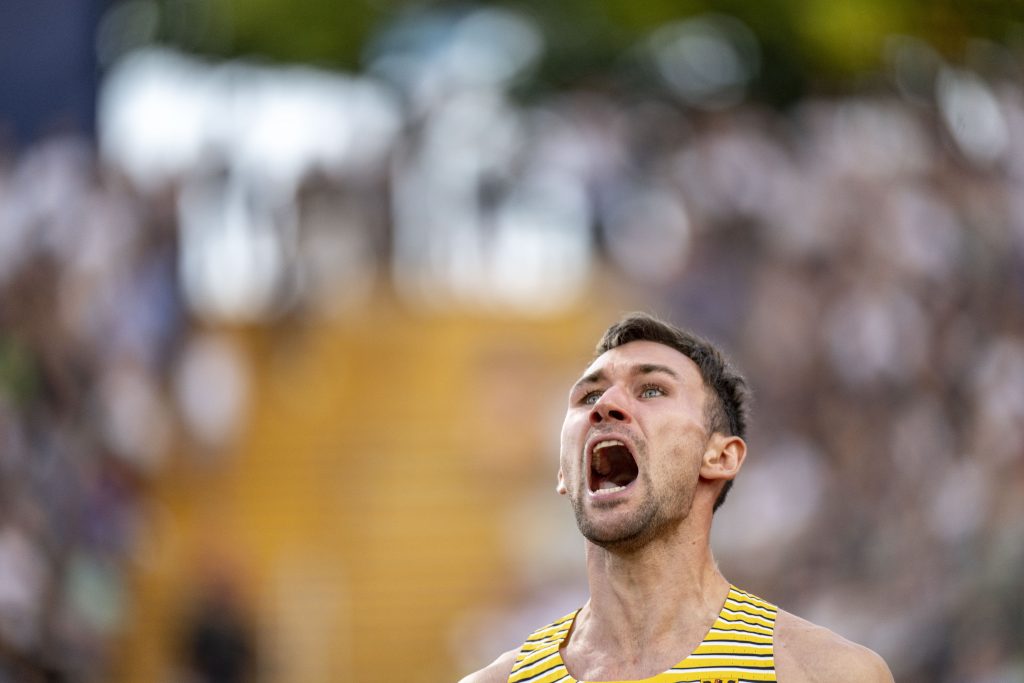
If Simon Ehammer felt any disappointment as his grip on the gold medal loosened, he should be consoled by the respect reflected in the scale of Kaul’s reaction to his monster throw. Ehammer had pushed Kaul to deliver a javelin performance that he had been unable to deliver in three years.
Kaul moved into third place, just 19 points behind Õiglane which the German would make up easily in the final event. But he was still 178 points behind Ehammer.
If Kaul ran 4:15, then he would have to hope that Ehammer did not match his 4:42 PB.
If Kaul ran 4:13, he would have to hope Ehammer didn’t dip under 4:40 for the first time.
Ehammer’s one advantage was that Kaul would have no idea what was happening behind him – whether Ehammer was on course to run 4:45, 4:42 or faster to cling onto gold.
After nine events:
- Simon Ehammer 7842
- Janek Õiglane 7683
- Niklas Kaul 7664
- Maicel Uibo 7567
- Dario Dester 7548
- Kai Kazmirek 7513
- Marcus Nilsson 7505
- Sander Skotheim 7442
- Adam Sebastian Helcelet 7366
- Baptiste Thiery 7233
1500M
The remaining 15 men were introduced in reverse order.
Kaul was the first of the medal contenders to emerge from the tunnel, greeted by a deafening clamour, his expression resolute.
Õiglane was next. Too far away from gold and silver, at peace with the likelihood that Kaul would overtake him but motivated to secure bronze.
And Ehammer, as the leader, was the last to appear. Always popular in Germany, he was greeted with warmth. But on this occasion this crowd would be willing another onwards towards the gold.
As the decathletes assembled on the curved line to embark on the final 1500m, the officials waved them away, a technical issue delaying the start. Two, three minutes passed, the tension unbearable.
Kaul’s features remained inscrutable, utterly focused on the four minutes that would follow the gunshot, whenever it eventually arrived.
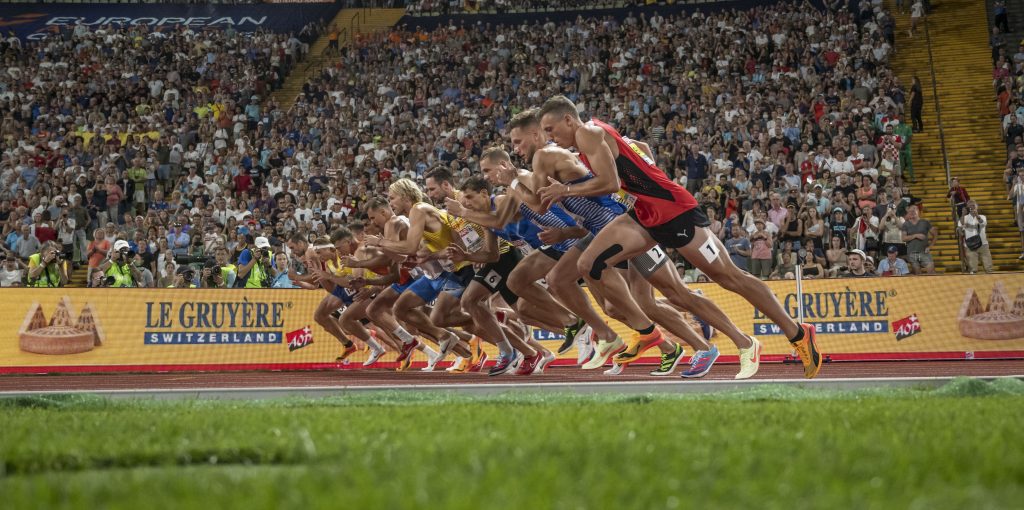
Finally, they were away, and the fast men – Nilsson, Roosen and Thiery – broke away. Kaul joined them but soon surged ahead. He settled into his familiar metronomic stride, apparently immune to the effort visible on the faces of the three behind him.
In each 100m that passed, Kaul put more distance between himself and Ehammer – the latter moving steadily but doing so near the rear of the field. Kaul seemed to get faster and faster, moving further and further away.
As he entered the final 100 metres, the stadium was on its feet for the home country hero.
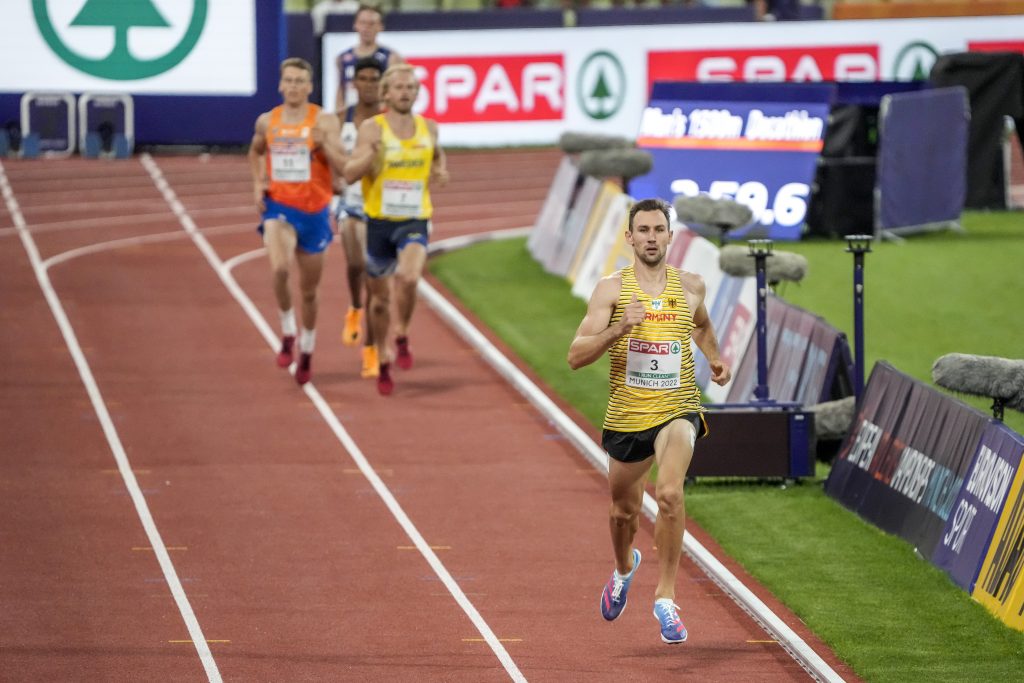
Kaul crossed the line in 4:10, the fastest time ever run in a decathlon of this standard.
Thirty-eight seconds later, Ehammer crossed the line in 4:48, his second fastest run ever as a senior.
Kaul had needed 72m and 4:13.
He had delivered 76m and 4:10 to score 8545, to Ehammer’s 8468.
The steely façade gave way and Kaul collapsed in relief, hugging the 22-year-old who had pushed him so hard.
“The Olympic Stadium will have a special place in my life and in my heart,” Kaul said afterwards. “We will never in our lives forget what we have lived here tonight. Before the javelin I was kind of down, I thought that the gold was gone. But throwing 76m then showed me that after my elbow surgery I am back with my strong javelin event, I still can do it. Before the 1500m I did not want to look at the standings. The 1000m were 5 seconds faster than we had planned, the audience pushed me through the 1500m, incredible. My ears nearly fell off, they were so loud. Incredible! Insane! This is my most emotional title, after all that I have been through in the last three years which were sub-optimal. Every event in decathlon writes its own story and at the end everything comes together.”
“Before the 1500m Simon Ehammer and me came together and said to each other ‘No matter what will happen in the 1500m, it has definitely been a special competition for both of us’. This is the most beautiful story. Munich will have special place in my heart. Today’s emotional title is worth more the world title I won three years ago. It is so beautiful to enjoy the atmosphere and the support from the crowd in the Olympic stadium.”
For his efforts, Ehammer had been rewarded not only with his third decathlon NR of the year, but a first score over 8400. With more work on the discus and the 1500m, 8500 beckons.
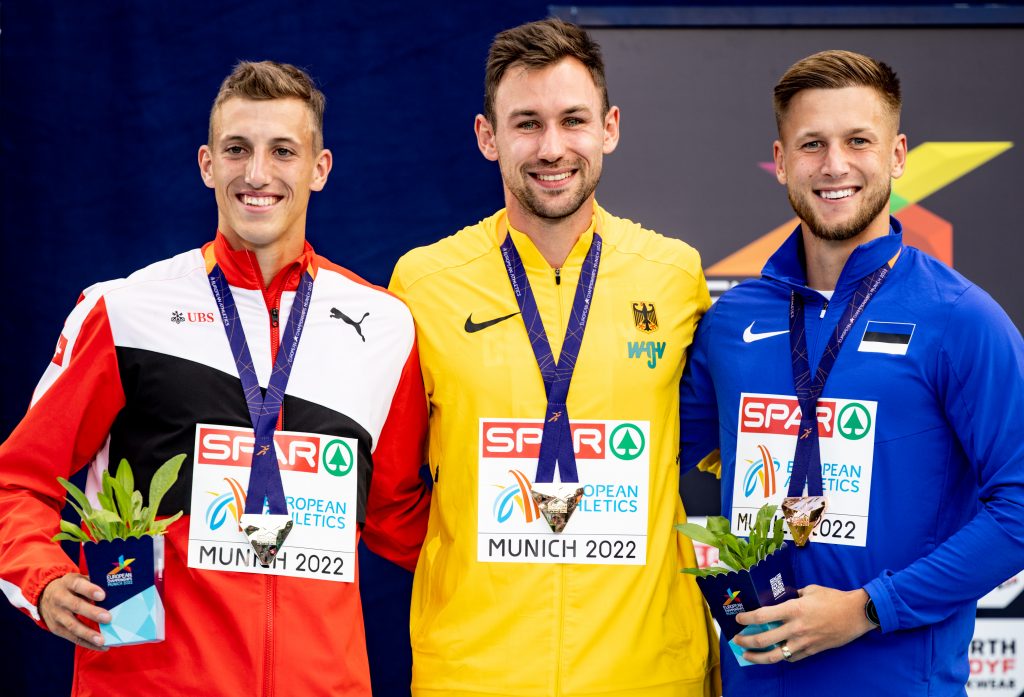
Õiglane had secured bronze with his third best score ever, 8346 but it had been close. Marcus Nilsson had closed to within 20 points of third place in 8327, adding over 200 points to his PB which he had come so close to beating in Arona this year.
“It was nice to finally get some more points,” Nilsson reflected “because I’ve been doing three decathlons over 8100 so it’s nice to step up. I was really tired after my first day, and I struggled a little bit in hurdles and discus today – but then a little PB in the pole vault. I also managed to throw a good javelin as well, that was a little bit unexpected for me. Both javelin and 1500 were very loud – it was nice!”
Õiglane said: “When I saw on the scoreboard that I got third, some tears came to my eyes for sure. It just pays off all the hard work I’ve put in. I have huge foot problems, that’s why I have been up and down, training has been up and down, sometimes I can train properly, sometimes I need a break. The foot problem was why I didn’t compete till the end in Eugene, and I think I did a pretty smart decision. It’s just an amazing feeling to come through such a hard three years and go away with the medal.”
Dario Dester, who had shadowed Ehammer all the way through to the pole vault, annihilated the Italian record that had stood for 26 years, scoring 8218.
“I work a lot for this record and I’m really happy, particularly of the three PBs in the throws – I worked really, really lot in the last month and I’m super, super happy.”
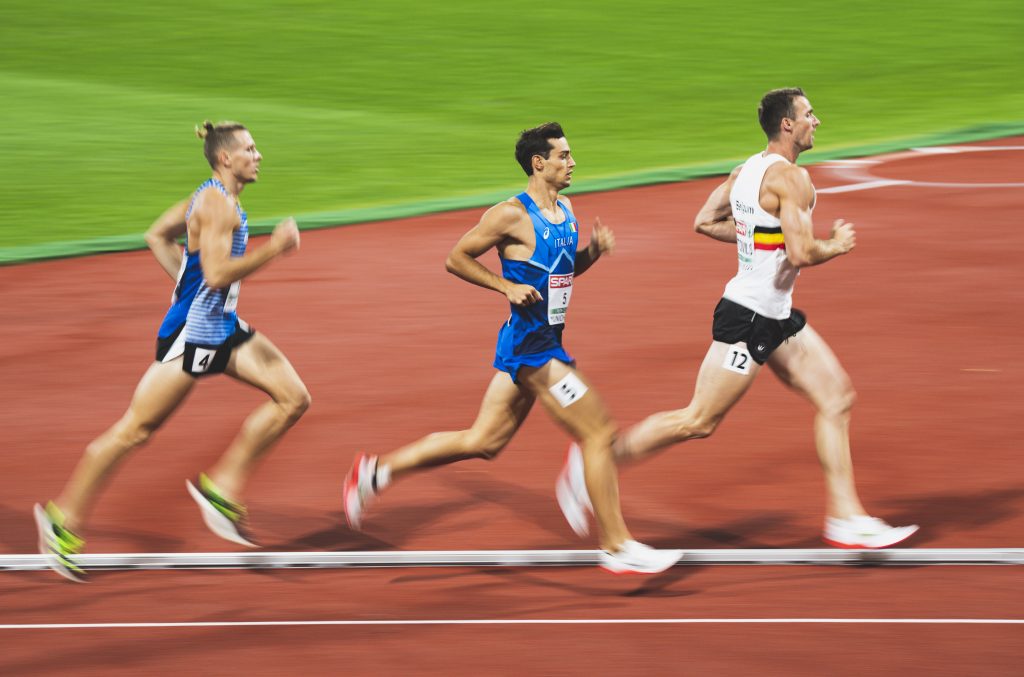
And France gained another 8000-point decathlete, as Baptiste Thiery finished in 8057, his first time over 8000 points.
Overall, fifteen men finished, eleven over 8000 points, and the four under 8000 all with highly respectable scores given the respective battles they had been through to get to the starting line.
And the competition finished, as it had done in Berlin 2018, with a lap of honour for Arthur Abele. This time the tears were for a different reason, as he bade farewell to decathlon, honoured by his competitors, and with the meaningful words:
“Decathlon is my heart, my will, my everything.”
Final results:
- Niklas Kaul 8545
- Simon Ehammer 8468 NR
- Janek Õiglane 8346
- Marcus Nilsson 8327 PB
- Maicel Uibo 8234
- Dario Dester 8218 NR
- Sander Skotheim 8211
- Kai Kazmirek 8151
- Baptiste Thiery 8057 PB
- Sven Roosen 8021
- Adam Sebastian Helcelet 8000
- Niels Pittomvils 7862
- Fredrik Samuelsson 7757
- Martin Roe 7754
- Arthur Abele 7662
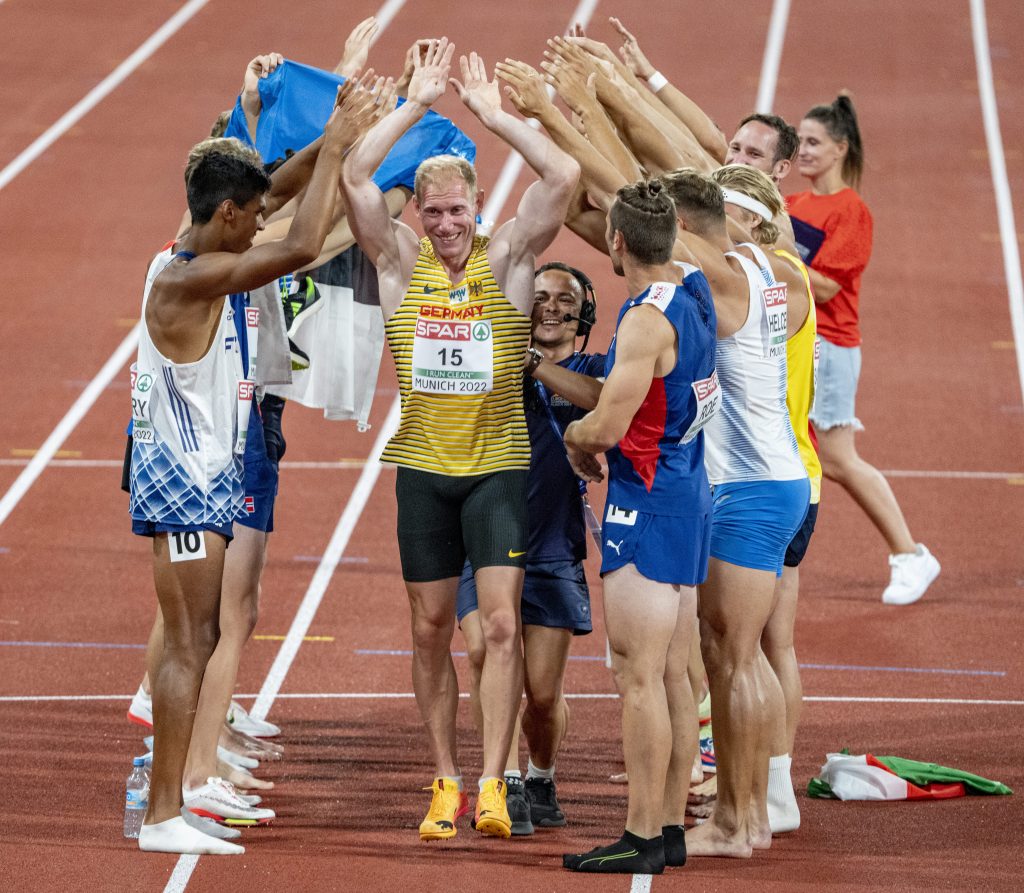
Article cover/featured image: Thomas Niedermueller/Munich 2022

